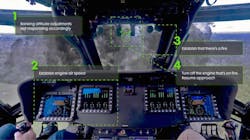BALTIMORE - The Defense Advanced Research Projects Agency’s (DARPA) has awarded a contract to Northrop Grumman Corp. in Falls Church, Va., to develop a prototype artificial intelligence (AI) assistant for UH-60 Blackhawk pilots. The prototype will be embedded in an augmented reality (AR) headset to help rotary pilots perform expected and unexpected tasks.
Rotorcraft aircrews face numerous demands particularly when flying in close proximity to buildings, terrain, people and from the threat of adversary RADAR systems. Today, simple warning systems are the most common means for aiding a rotorcraft aircrew, such as auditory alerts to increase altitude. These warning systems are limiting and can induce unanticipated cognitive burdens on pilots. Studies have shown that inattentional blindness to such warnings can occur, often making them ineffective for the aircrew.
DARPA’s PTG program aims to develop AI technologies to help users perform complex mental and physical tasks. The goal is to provide users of PTG AI assistants with wearable sensors that allow the assistant to observe what the user perceives and know what the user knows. Using advanced information processing and an AR interface, the goal of the program is to have the AI assistant provide feedback and guidance through speech and aligned graphics at the right place and time to augment the aircrew.
“The goal of this prototype is to broaden a pilot’s skillset,” said Erin Cherry, senior autonomy program manager, Northrop Grumman. “It will help teach new tasks, aide in the recognition and reduction of errors, improve task completion time, and most importantly, help to prevent catastrophic events.”
In addition to a long service life in the U.S. and allied militaries, a civilian version of the venerable Blackhawk is also available.

